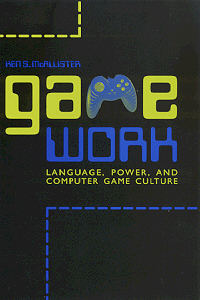introduction
|
| ideology | |||
|
If there is a weakness to McAllister's approach, it is that there are moments when, despite itself, his grammar appears much more structuralist than it is. In part, this is a function of one of the strengths of the book: in his concern with introducing and explaining the relationships between the various elements of his grammar, McAllister is careful to subdivide each element into discreet areas of inquiry. For example, to explain what he means by agents, he writes that "there are four primary agent categories in the computer gaming industry, each of which has many subtypes" (45). He does much of the same thing to explain what he understands as influences, writing that "[t]he five major influences on the computer game complex are those that the complex itself imposes on culture" (50). While this practice helps readers makes sense of his method, there are moments when McAllister's emphasis on identifying "primary types" (45) and "major influences" (50) suggests an empirical taxonomy rather than the socially constructed categories that are the sites of dialectical struggle and thus constantly being revised. This disjunction is perhaps most problematic in Appendix A of his book, where McAllister's presents the elements of his grammar in a neatly spaced and proportioned diagram. The square edges and the straight, sharp lines of this diagram stand in sharp contrast to the second part of McAllister's book, where he employs his grammar fluidly to read computer games like Black and White. A similar complaint can be made about McAllister's approach to dialectic, ideology, and materiality. McAllister's definition of the dialectic as "an existential condition in which struggle and change are the only constants and to which all materiality is subject" (29) echoes Judith Butler's view that matter is not a "site or surface, but [. . .] a process of materialization that stabilizes over time to produce the effect of boundary, fixity, and surface we call matter" (9). Yet his claim that "[o]nly the dialectic is unhindered by ideology, because its very motion is that of ideologies in constant conflict" (31) is problematic in that it suggests that McAllister is working from a definition of ideology that presupposes it (ideology) as an essential part of a larger structure (the dialectic) that transcends language. This is essentially the position that Louis Althusser takes in his influential "Ideology and Ideological State Apparatuses" when he argues that "ideology has no history" (159). Using Freud's formulation of the unconscious as a model, Althusser explains "If eternal means, not transcendent to all (temporal) history, but omnipresent, trans-historical and therefore immutable in form throughout the extent of history, then I shall adopt Freud's expression word for word and write that ideology is eternal, exactly like the unconscious" (161). Ideology, like the unconscious, is thus an essential component of human experience to Althusser. While this view is compelling, it is important to consider the alternative position that Jean Baudrillard presents in Simulacra and Simulation. There, he argues that it is no longer possible to speak about ideology because it is no longer possible to speak about the real. To locate the "real conditions of existence" that are a crucial part of Althusser's dialectical definition of ideology is to locate merely "a representation of the imaginary relationship of individuals to their real conditions of existence" (162). Baudrillard writes: In the same way, it is no longer a question of the ideology of power, but of the scenario of power. Ideology only corresponds to a corruption of reality through signs; simulation corresponds to a short circuit of reality and to its duplication through signs. It is always the goal of ideological analysis to restore the objective process, it is always a false problem to wish to restore the truth behind the simulation. (27) And it is here, in this sense of the "objective process" of McAllister's grammar that it would ultimately be a mistake to interpret his methodology as rigid or universal, even granting his taxonomy and the fixed proportions of the diagram in Appendix A. Rather, McAllister sees the game complex as a vast, socially constructed network of meaning-making and his methodology as one that exposes the mechanisms of power within it. McAllister's emphasis is on preparing scholars to approach the computer game complex as a socially constructed site of social, cultural, and political struggle. By implicitly providing a space for the examination of "real conditions of existence," the term ideology may suggest to some a point of stability—a larger truth—where perhaps there is none. But there are certainly others who would readily attack McAllister's post-structuralism for an even more materialist view of the computer game complex. |
